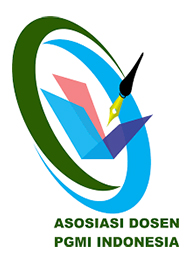Kedudukan Kurikulum Pendidikan Agama Islam di Sekolah dan Madrasah
Abstract
This study explains that in the national education curriculum, the fiqh curriculum is one of the derivatives of the national education goals. The fiqh curriculum becomes a branch of religious science whose supporters achieve national education goals, specifically in the character-building of students. The method used is a qualitative approach through library research so that in analyzing data with literature analysis. In facing an era like this, the teachings of norms are needed for students. So that the learning of fiqh acts as a guide for students in distinguishing a problem, good or bad in terms of religion and socially. Learning of fiqh in schools and madrasahs itself is based on government regulation (PP) number 55 of 2007. The regulation contains religious and religious education which is a derivative of the national education goals. Therefore, this research aims to describe the position of the Islamic Religious Education Curriculum (PAI) in learning Fiqh in the context of the National Curriculum. The legal basis of the Islamic Religious Education (PAI) curriculum in fiqh learning, as well as the learning function of fiqh in schools and madrasas The current and last context is the benefit of fiqh learning for students in responding to social life.
Full Text:
PDFReferences
Mansir F. Identitas Guru PAI Abad 21 Yang Ideal pada Pembelajaran Fiqh di Sekolah dan Madrasah. Muslim Heritage. 2020;5(2):435. Doi : http://dx.doi.org/10.21154/muslimheritage.v5i2.2343
Amalia E, Ibrahim I. Efektivitas Pembelajaran Fiqih dengan Mengunakan Metode Demonstrasi di Madrasah Ibtidaiyah Negeri Desa Penggage-Muba. JIP (Jurnal Ilmiah PGMI). 2017;3(1):98–107. Doi : https://doi.org/10.19109/jip.v3i1.1380
Nurkholis N. Pendidikan dalam upaya memajukan teknologi. Jurnal kependidikan. 2013;1(1):24–44. https://doi.org/10.24090/jk.v1i1.530
Mukani M, Sumarsono T. Pendidikan Karakter Peduli Lingkungan Berbasis Adiwiyata pada Mata Pelajaran Fiqih di MTsN Tambakberas Jombang. Jurnal Pendidikan Agama Islam (Journal of Islamic Education Studies). 2017;5(2):181–200. Doi : https://doi.org/10.15642/jpai.2017.5.2.181-200
Siswadi MPI. Implementasi Pembelajaran Fiqih Berbasis Life Skill di MI Al Hasan Kecamatan Sumpiuh, Kabupaten Banyumas. Doi: https://doi.org/10.24090/jpa.v17i2.2016.pp251-271
Mansir F. Diskursus Pendidikan Karakter di Peguruan Tinggi Keagamaan Islam pada Era Milenial. Tadrib. 2018;4(2):280–300. Doi : https://doi.org/10.19109/tadrib.v4i2.2560
Mansir F. Analisis model-model pembelajaran fikih yang aktual dalam merespons isu sosial di sekolah dan madrasah. Ta’dibuna: Jurnal Pendidikan Islam. 2021;10(1):88–99. Doi : https://doi.org/10.32832/tadibuna.v10i1.4212
Mansir F. The impact of globalization on islamic education toward fiqh learning existence in covid-19 pandemic period. ATTARBIYAH: Journal of Islamic Culture and Education. 2020;5(2):123–33. Doi : https://doi.org/10.18326/attarbiyah.v5i2.123-133
Mansir F. The Urgency of Fiqh Education and Family Role in The Middle of Covid-19 Pandemic For Students In School and Madrasah. Kamaya: Jurnal Ilmu Agama. 2021;4(1):1–10.
Iqbal MM. Merumuskan Konsep Fiqh Islam Perspektif Indonesia. Al-Ahkam Jurnal Ilmu Syari’ah dan Hukum. 2017;2(1). Doi : https://doi.org/10.22515/alahkam.v2i1.820
Setiawan E. Kamus Besar Bahasa Indonesia (KBBI) Online. KBBI Indones. 2012;
Mansir F. Diskursus Sains dalam Kurikulum Pendidikan Agama Islam di Sekolah dan Madrasah Era Digital. Kamaya: Jurnal Ilmu Agama. 2020;3(2):144–57. Doi : https://doi.org/10.37329/kamaya.v3i2.437
Sobri R. Politik dan Kebijakan: Pendidikan Agama dan Keagamaan di Indonesia (Analisis Kebijakan PP No 55 Tahun 2007). Edukasi Islami: Jurnal Pendidikan Islam. 2019;8(01):109–24. Doi : https://doi.org/10.30868/ei.v8i01.322
Mansir F. Pendekatan Psikologi Dalam Kajian Pendidikan Islam. Psikis: Jurnal Psikologi Islami. 2018;4(1):61–73. Doi : https://doi.org/10.19109/psikis.v4i1.2042
Mansir F. Implications of Teacher Certification on Professionalism and Welfare of 21th Century PAI Teachers. Tadrib. 2019;5(2):138–52. Doi : https://dx.doi.org/10.19109/tadrib.v5i2.4085
Muttaqin AR. Penerapan teori Insight In Learning perspektif Wolfgang Kohler dalam pembelajaran Fiqih. IAIN Sunan Ampel Surabaya; 2010.
Qolbi SK, Hamami T. Impelementasi Asas-asas Pengembangan Kurikulum terhadap Pengembangan Kurikulum Pendidikan Agama Islam. EDUKATIF: JURNAL ILMU PENDIDIKAN. 2021;3(4):1120–32. Doi : https://doi.org/10.31004/edukatif.v3i4.511
Sugiana A. Pengembangan Kurikulum Pendidikan Agama Islam dan Implementasinya di MTS Nurul Ummah Yogyakarta. Jurnal Pendidikan Agama Islam. 2019;16(1):17–34. Doi : https://doi.org/10.14421/jpai.jpai.2019.161-02
Umalee MH. Proses pembelajaran fiqih di Kelas II MTs Ma’had Al-Khairiyah: Sekolah Phattana Islam Wittaya Yala, Thailand Selatan. Universitas Islam Negeri Maulana Malik Ibrahim; 2015.
Mutawali M. Pemikiran Hasybi Ash-Shiddieqy dalam Hukum Islam. Al-Ittihad: Jurnal Pemikiran dan Hukum Islam. 2015;1(1):19–32. Doi : https://doi.org/10.61817/ittihad.v1i1.3
Karim A, Mansir F, Saparudin T. Managerial leadership in boarding and public school: An idea and experience from Indonesia. Journal of Talent Development and Excellence. 2020;12(2s):4047–59.
Mansir F. Kesejahteraan Dan Kualitas Guru Sebagai Ujung Tombak Pendidikan Nasional Era Digital. Jurnal IKA PGSD (Ikatan Alumni PGSD) UNARS. 2020;8(2):293–303. Doi : https://doi.org/10.36841/pgsdunars.v8i2.829
Setiawan A. Pembelajaran Fiqih di lembaga pendidikan formal: Studi ketuntasan belajar di MTs Pembangunan Kikil Pondok Pesantren Al-Fattah Kikil Pacitan. Universitas Islam Negeri Maulana Malik Ibrahim; 2017.
DOI: http://dx.doi.org/10.21927/ijeeti.2024.3(2).64-73
Refbacks
- There are currently no refbacks.
Indonesian Journal of Elementary Education and Teaching Innovation ( IJEETI ) indexed by:

IJEETI by Authors is licensed under CC BY-SA 4.0






